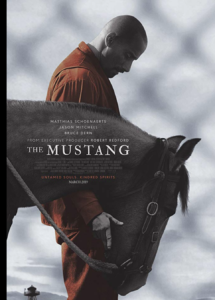The Mustang
**
The Mustang-rm
 There is a program in a western U.S. maximum-security prison where inmates can learn how to train a wild mustang horse. If they succeed the horse can be sold at auction. Horses that can’t be tamed are often euthanized.
There is a program in a western U.S. maximum-security prison where inmates can learn how to train a wild mustang horse. If they succeed the horse can be sold at auction. Horses that can’t be tamed are often euthanized.
We meet Roman Coleman (Matthias Schoenaerts) a somewhat taciturn violent prisoner who becomes involved in this program. There are interesting well-photographed scenes where we see the trials and tribulations of men working with their horses. There are short but well-done supporting roles by Connie Britton a prison psychologist and Bruce Dern who plays the old guy who tells the prisoners how to train their horses.
Unfortunately, we learn very little about the previous background of the main protagonist as we are just given fleeting glimpses of what happened to him and his relationship with his adult daughter (Gideon Adlon) who visits him periodically in the prison. We learn essentially nothing about the other prisoners who are participating in the program and must have stories to tell.
Seeing a wild horse show some recognition to the human trying to train him is a touching emotional experience but is not enough to carry this film and make it worthwhile. We feel that the storyline failed and therefore the movie failed, however, well directed by Laure de Clermont-Tonnerre. Even though there were some great scenes of horses running wild or even cozying up to their trainer, we just cannot recommend this movie. (2019)
Any comments are welcome in the section belowÂ
Category: 2 Stars, Drama | Tags: 2019, Bruce Dern, Connie Britton, Gideon Adion, horses, Laure de Clermont-Tonnerre, Matthias Schoenaerts, mustangs, prison, The Mustang, training horses 2 comments »




May 11th, 2019 at 2:55 AM
The importance of this beautiful film relates to the positive aspects of animal therapy. Men and women in prison have missed early nurturing and most often a transitional object. The horse in this film represents a living transitional object and one watches the unfolding of of humanness/ tenderness in the prisoners and especially Roman as the film unfolds. Thus becomes very clear near the end when he puts up a photo of his daughter and grandchild. The prisoners show true sadness when they must part with the horses at the end if training. It dies not take a psychoanalyst to fill in the gaps in the story – just life experience and common sense. As a bonus the photography is outstanding including close up shots! This us one if the few films that depicts prison life in such a realistic fashion without extraneous melodrama. Yes, I believe the reviewers have missed the point if thus film as will most people, especially thise not familiar with horses and those living in urban areas. By the way, the horse therapy program is immensely successful with the prison population minimizing recidivism and providing an opportunity to “ humanize†a lost being.
May 15th, 2019 at 5:44 AM
I thank Dr. Turco for his insight and comments about this film. MB